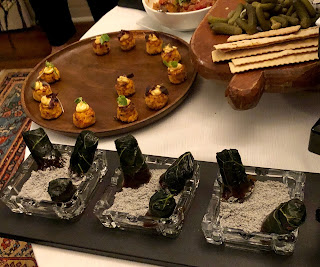 |
| Server at the Greenhouse Inn |
Having just written a blog post Tuesday about putting my suit jackets away, it makes sense that Wednesday I found myself slipping into my blue Lauren blazer to go to lunch with my old friend, Sister Rosemary Connelly, at Misericordia, the revered Chicago residence for people with development disabilities.
The Greenhouse Inn at first glance seems to be a regular, run-of-the-mill family restaurant, perhaps a little nicer than most.
The decor is sea-foam green and pastel pink, with cheery if not quite inspired artwork and hanging plants. The napkins are linen, and slices of lemon float in the ice water. There's a salad bar with melon slices and hearty soups, and even a little bakery section, where customers can take home specialty breads and delicate pastries.
But the Greenhouse, 6300 N. Ridge, is one of the most unusual restaurants in Chicago. You get a hint of that before you even have a chance to sit down.
"Hi, I'm Rhonda," says a waitress, earnestly, extending her hand to shake.
Rhonda is a slight woman, 23, and her features have the distinctive cast of a person with Down syndrome.
So does Richard, in his chef's hat, filling orders back in the kitchen. And Brian, washing dishes. And Bill, clearing tables.
In fact most of the employees of the Greenhouse Inn are people with disabilities, either Down syndrome or some other type of condition.
"The restaurant reminds me of a tea room, so light and cheerful and happy," says Lesley Byers, a spokesman for Misericordia, a residence run by Catholic Charities housing some 450 people with disabilities at two locations. "It shows such a positive feeling, and is so non-institutional. It surprises a lot of people here for the first time."
The Greenhouse Inn, reopening today after its summer hiatus, is one of many businesses run by Misericordia, from a crafts and ceramics manufacturer to a greenhouse to a full-size professional bakery.
All are designed to give residents job skills and, not incidentally, offer the public a chance to learn that people with mental and physical disabilities are capable of functioning in productive ways.
"You think, `This is the '90s, people are more open and understanding,' " Byers says. "But there is still such a stigma against people with any type of disability—minds are closed against them."
The Greenhouse differs in a few ways from a regular restaurant.
Since some of the employees can't read, patrons mark their own orders on brightly colored order slips. The restaurant cannot advertise because of its nonprofit status and, perhaps most unusual for an urban eatery, the workers are not all aspiring actresses or playwrights, but people who really want to work in a restaurant.
"I like to serve food and drinks," Rhonda says. "It's fun."
"It helps me with my confidence," Bill, 25, says. "It's also good for friends and volunteers. And the free lunch."
That is not to say that the job is without its drawbacks. Like anywhere else in the food service industry, the pace sometimes gets to the employees of the Greenhouse.
"Stress," Bill says, asked about the drawbacks of the job.
"Walking around too much," Rhonda says.
Another waiter, Scott, looks weary as he trundles toward the kitchen and, asked why, slaps the back of a hand to his forehead and says, "I'm a wreck."
About 40 residents work for the restaurant daily, aided by Misericordia staff and volunteers, who do some of the more dangerous tasks, like working the grill.
Like any restaurant, the Greenhouse attracts a particular clientele. No sharp guys in Armani suits with cellular phones stuck to their ears here. Patrons tend to be older and many are from the neighborhood, such as the Bible study group that was having a going-away luncheon for one of its members. "We like to come here—it's always fun," Don Breting says. "The servers are happy people."
The Greenhouse Inn is open weekdays from 11 a.m. to 2:30 p.m.







